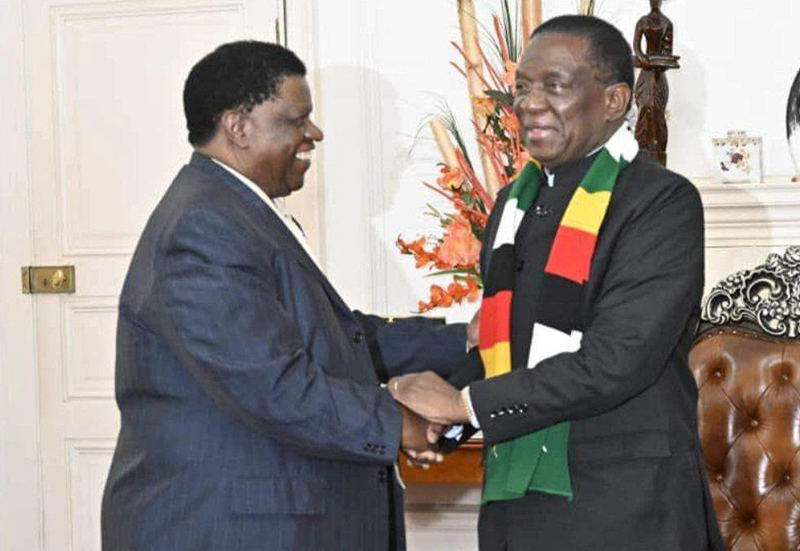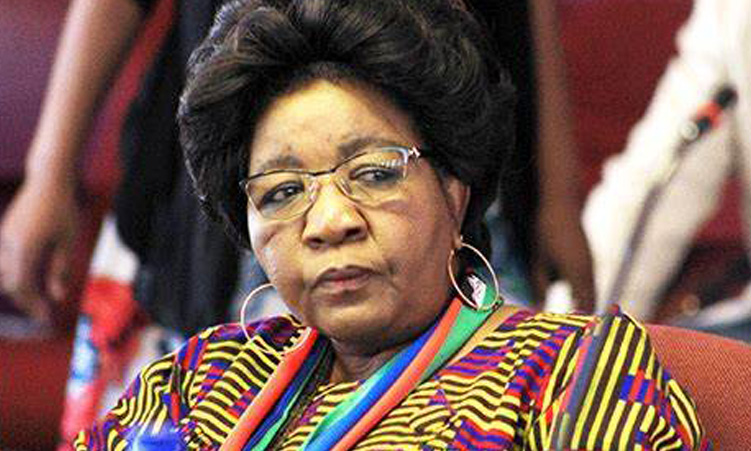- Featured
- No Comment
‘Dubious if not suspicious’: Mnangagwa’s ‘private’ meeting with Namibia minister roils opposition ahead of elections

By The Namibian
NAMIBIA: The ruling Swapo party’s secretary general Sophia Shaningwa says the party had no idea that labour minister Utoni Nujoma met with Zimbabwean president Emmerson Mnangagwa.
Nujoma met with Mnangagwa, the current chairperson of the Southern African Development Community (SADC), for a “private visit” at state house in Harare on Friday.
Shaningwa told The Namibian Swapo was unaware of the meeting and its details.
“I have no idea,” Shaningwa said.
According to the Zimbabwean media, Nujoma told journalists his meeting was private, although he spoke about history and his past interactions with Mnangagwa.
“I am here on a private visit, and as you know when the president was minister of justice, I was the minister of justice in Namibia. Since then we have been working together to try to resolve the region’s problems,” Nujoma said.
Nujoma, however, did not answer The Namibian’s calls or questions sent to him regarding the purpose of his visit to Mnangagwa.
‘SUSPICIOUS’

“That this happens a few weeks before elections in Namibia and after earlier visits by party leaders to China, and the close personal relations of the Swapo presidential candidate’s husband to another lead figure in Zimbabwe, makes it even more dubious if not suspicious,” Melber says.
Whatever the purpose of the meeting, it triggers much speculation, Melber adds.
“This is a rather unfortunate dynamic unfolding, which fuels fears of a scenario, which in the case of an electoral defeat of Swapo, may end in similar dynamics as Zimbabwe when the opposition was cheated and denied to take over the presidency and government,” he says.
The fact that Nujoma refers to the amicable solution of the fast-track of land reform by de-legitimising the SADC Tribunal and its ruling as a kind of victory, adds to concerns, he says.
“Warning bells should be ringing in the opposition. Maybe this is a wrong interpretation, but a self-inflicted one. Swapo should be more careful not to fuel any suspicions that it would be willing to ignore the electorate’s will if the result does not go its way.”
Melber says Nujoma should come clean and apologise. He also calls on Swapo to take Nujoma to task for the visit.
“Given that the former liberation movements, as governments in SADC, have since decades an agreement to support and protect each other, there has of course never been an impartiality of their leaders as heads of SADC,” he adds.
Political analyst Ndumba Kamwanyah says private meetings between government officials and heads of state should be approached with caution, especially regarding transparency and diplomatic protocols.
“Public officials are expected to conduct meetings that serve national interests openly, not privately, to avoid potential conflicts of interest or misunderstandings,” he says.
Given Mnangagwa’s role in SADC and SADC’s role in observing elections, the meeting could raise concerns about partiality.
“Transparency is critical to ensure neutrality and trust in SADC’s decisions. The longstanding relationship between Swapo and Zanu-PF, amid allegations of previous election rigging by Zanu-PF, could lead to perceptions of collusion or influence, especially if the meeting’s purpose isn’t clear.”
Meanwhile, Popular Democratic Movement lawmaker Maximalliant Katjimune says it is more worrying that Nujoma was quoted saying Namibians can learn from Zimbabwe.
“This is just hogwash and a figment of his imagination. We learn nothing from an autocratic and despotic regime like the one of Zanu-PF. Namibian society is built on the values of democracy and the respect for human rights, which is diametrically opposed to the values of the Zimbabwean government,” Katjimune adds.
